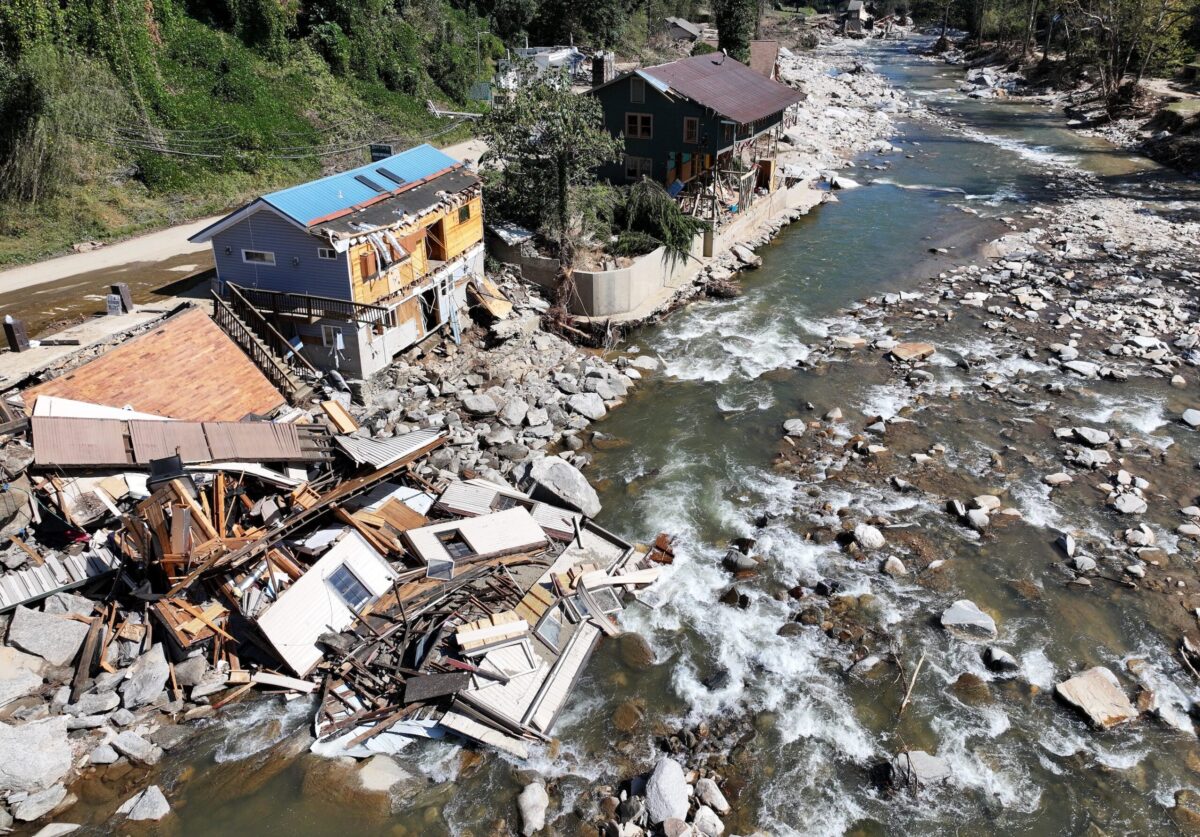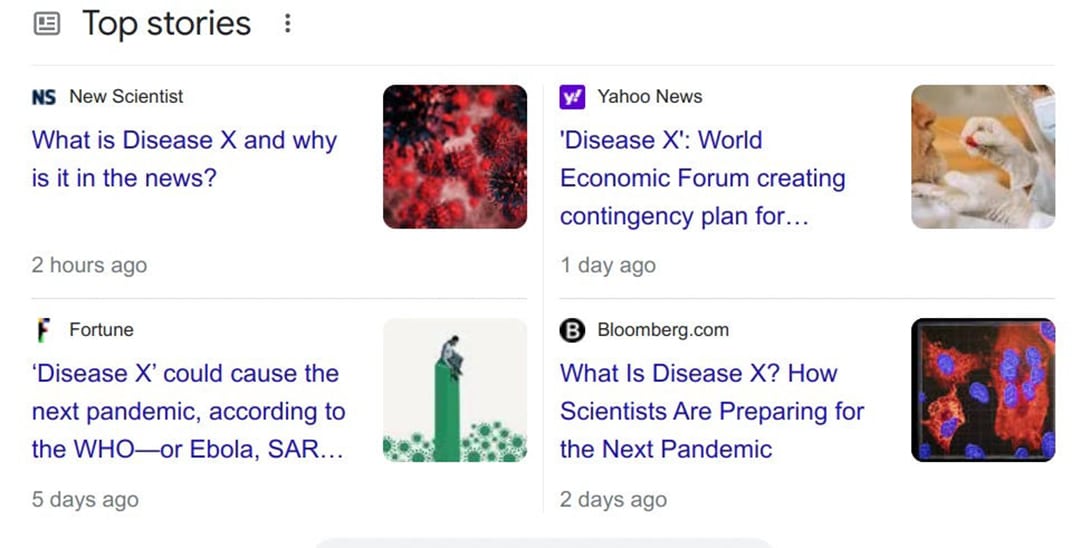

The Hurricane Speech Panic is Here
by Matt Taibbi |Oct 12, 2024
A week ago, before America felt the full weight of the Hurricane Helene and Milton disasters, Homeland Security chief Alejandro Mayorkas said his Federal Emergency Management Agency “does not have the funds to make it through the [hurricane] season.” Late this week FEMA contradicted its own boss:
In Covid-19, health officials issuing confusing or incorrect or shifting dictates caused significant loss of trust, which was then used as an excuse to call for clampdowns on the information landscape. Now a sequel misinformation panic is upon us, with incompetent disaster management stepping in the role of the health bureaucracy. Once again, we’re told it’s Donald Trump and other online miscreants the world cannot survive:
“I’m running out of ways to explain how bad this is,” wrote Charlie Warzel in the Atlantic. “Rumors on X are Becoming the Right’s New Reality,” added Renee DiResta. Stories in Politico, the New York Times, CNN, the Daily Beast, Vox, CBS, Bloomberg, the Guardian, USA Today, the Los Angeles Times similarly howled about the hurricane misinformation crisis.
As the theme built momentum through the week, it was only a matter of time before we saw the inevitable next-step headline, provided by Axios yesterday: Democratic members Kathy Castor (D-FL), Deborah Ross (D-NC), Nikema Williams (D-GA) and Wiley Nickel (D-NC) sent a letter Friday to Meta, X, TikTok, Discord, YouTube, Snap and Instagram saying, “In the aftermath of Helene, we have witnessed a troubling surge in misinformation, disinformation, conspiracy theories, and scams” that are “hindering recovery efforts and exploiting vulnerable individuals.”
Democratic members Kathy Castor (D-FL), Deborah Ross (D-NC), Nikema Williams (D-GA) and Wiley Nickel (D-NC) sent a letter Friday to Meta, X, TikTok, Discord, YouTube, Snap and Instagram saying, “In the aftermath of Helene, we have witnessed a troubling surge in misinformation, disinformation, conspiracy theories, and scams” that are “hindering recovery efforts and exploiting vulnerable individuals.”
The concrete example cited involved “posts on Facebook and X” that “claimed that FEMA was offering a new grant for immediate cash assistance,” resulting in a “flood of applications to non-existent programs.” Scams are already barred, and I doubt that “flood of applications” is so annoying to FEMA that they require cancellation of the First Amendment. But the lawmakers’ aim is broader, as is made clear by the demands they went on to list. Number one is the showstopper:
- Increase the monitoring and rapid removal of misinformation and disinformation related to disaster recovery efforts, particularly from verified or large-reaching accounts that have the potential to do significant harm.
- Enhance fact-checking partnerships with local agencies and disaster relief organizations, ensuring that accurate information about government programs, emergency shelters, and aid is readily available and prioritized across your platforms.
- Strengthen algorithms to flag and prevent the spread of harmful conspiracy theories that target disaster victims.
- Implement stronger safeguards against scams that prey on vulnerable individuals during disaster recovery, including ensuring that only verified organizations and entities can promote relief funds or disaster assistance programs.
Members of congress, seeking “monitoring and rapid removal” of “large-reaching accounts” who say things that have the “potential” to do “significant harm.” Who does that make you think of?
Take something Trump said at a rally in Butler, Pennsylvania last Saturday: “They’re offering them $750 to people whose homes have been washed away. And yet we send tens of billions of dollars to foreign countries that most people have never heard of.”
This comment somehow in CNN’s reporting became “Trump falsely claims the federal government is only giving $750 to people who lost their homes,” saying Trump “strongly suggested” Americans who lost homes were only getting $750 in aid. Vox, not even bothering with “suggested,” simply said Trump claimed hurricane victims were getting “just $750.” CBS, in its “misinformation” story: Trump claimed victims were “only being offered $750 in aid.” PBS on “lies, hoaxes, and conspiracy theories”: the $750 is “merely the immediate up-front aid” going to survivors. And so on.
Trump never said “only” and even a steelman reading of the original White House statements doesn’t make it sound like a flood of other help was coming. The first October 2 announcement said FEMA assistance for hurricane victims “can include a one-time $750 payment,” after which individuals are “eligible to apply” for additional help. Kamala Harris that same day spoke about $750 for those who “need immediate needs being met.” The “immediate, up-front aid” line was language from a cleanup press release posted by FEMA two days after the original White House statements, saying “there’s a rumor out there that FEMA is only providing $750,” which is “not true,” because there are other forms of assisistance you “may qualify for.”
When Trump claims that people like Biden or a Democratic Governor like Roy Cooper are “going out of their way to not help people in Republican areas,” that’s rhetoric that needs to come with proof, or else he absolutely should be criticized harshly for spreading unsupported allegations. His stump claims about DHS or FEMA funds being “stolen” or showered on illegal migrants similarly appear to be bullshit. But other parts of his critique are not, in particular his complaints about money for foreign engagements. Moreover it’s madness to say the state needs to resort to fiat messaging to counter “strongly suggesting” a thing, or Trump saying Biden’s hurricane response got “universally” bad reviews when it’s not literally “universal,” or claiming there are “no helicopters” as opposed to something like “too few,” and so on.
The $750 gambit was a real political unforced error by the Biden administration. The “one-time” payment line came less than a week after Biden announced $8 billion more for Ukraine after a cheery White House confab with Volodymyr Zelensky. Those funds came via the Ukraine Security Assistance Initiative, a program created in 2015 for which $32.7 billion has been appropriated. Worse, the $750 announcement came the same day Mayorkas gave his presser about running out of money. So, Biden had $8 billion to shove in Zelensky’s pockets, but his own DHS chief claimed to be running out of cash at the outset of a major domestic disaster.
FEMA run out once already this year, forcing Congress on September 25th to pass a continuing resolution freeing up $20 billion. But the agency spent about $9 billion of that on October 1st, over $7 billion of which went to earlier “hurricanes, wildfires and tornadoes.” Hurricanes Helene and Milton combined will surely drain the remaining cash: hence the October 2 presser by Mayorkas. Speaking of “misinformation,” multiple outlets shaded the Mayorkas comments to sound less absolute. Vox in its “Donald Trump’s Many, Many Lies About Helene, Debunked” story for instance wrote that “Mayorkas has warned that the DRF could run out of money before the end of hurricane season,” adding that this would be “due to the severity of this year’s storms,” as if that were relevant.
Meanwhile NPR in a story about “falsehoods” complained “the claim that FEMA has no money for hurricane recovery” has become “another popular refrain that has gained traction on the right.” (It came from Biden’s own White House!) Mayorkas since the October 2nd presser has fallen somewhat in line, repeating a weaker version of the current White House position. Instead of claiming “sufficient funding” to handle both storms, he says things like “We can meet the immediate needs,” but keeps repeating there’s an urgent need for Congress to provide funding. Again, the government needing additional appropriations to handle storms when it’s been shoveling hundreds of billions overseas for war is not a Trump-created issue.
In an October 4th letter, Biden wrote that while “FEMA has the resources needed for the immediate emergency response phase” and its “Disaster Relief Fund has the resources it requires right now to meet immediate needs,” the fund “does face a shortfall at the end of the year.” Ask yourself if that squares with Mayorkas comments from Thursday about being on “shaky ground” funding-wise and needing more money from Congress like, right now:
We learned with Covid that health officials issuing wrong or contradictory dictates about everything from masking to social distancing to mortality rates to vaccine efficacy inspired enormous distrust in the population. Officials decided the fastest route to regaining the public’s confidence was to deprive people of alternative sources of information, claiming a health emergency as their censorship casus belli. Now, weeks before an election, they’re trying to use hurricanes to shut down critics of the White House again.
It’s been clear for a while that the goal of the anti-disinformation crew is an American version of the Digital Services Act, which conceptually is just what yesterday’s congressional letter asks for. Keep the quasi-monopolistic platforms private, so they can “legally” violate rights, but make companies de facto subordinates to state guidance. Officials will keep drumming up panics, and keep asking for the same review power. Sooner or later — and it might be sooner, sadly — they’ll get it.







0 Comments